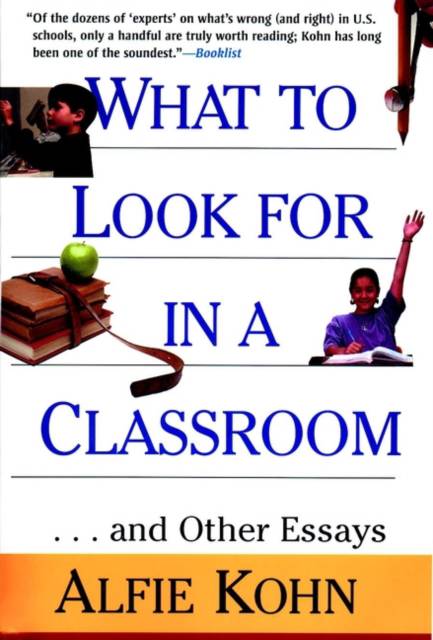
- Retrait gratuit dans votre magasin Club
- 7.000.000 titres dans notre catalogue
- Payer en toute sécurité
- Toujours un magasin près de chez vous
- Retrait gratuit dans votre magasin Club
- 7.000.0000 titres dans notre catalogue
- Payer en toute sécurité
- Toujours un magasin près de chez vous
37,45 €
+ 74 points
Description
"Alfie Kohn has a knack for bursting the bubbles that surround just about every school topic imaginable, from putting kids into uniforms to make them behave better to raising kids' self-esteem by rewarding them with stickers and pizza for reading books and doing homework. This collection of previously published essays reminds us that many schools have veered off course in their day-to-day business. And it's a primer that, if taken seriously, can put schools back on the right track."
--Educational LeadershipThrough his writings and speeches, Alfie Kohn has been stirring up controversy for years, demonstrating how the conventional wisdom about education often isn't supported by the available research, and illuminating gaps between our long-term goals for students and what actually goes on in schools. Now What to Look for in a Classroom brings together his most popular articles from Educational Leadership, Phi Delta Kappan, and Education Week--and also from The Atlantic Monthly, the Boston Globe, and other publications.
From self-esteem to school uniforms, from grade inflation to character education, Kohn raises a series of provocative questions about the status quo in this collection of incisive essays. He challenges us to reconsider some of our most basic assumptions about children and education. Can good values really be instilled
in students? What, if anything, lies behind the label of attention deficit disorder? Are there solid data to support our skepticism about watching TV? Might such allegedly enlightened practices as authentic assessment,
logical consequences,
and Total Quality education
turn out to be detrimental? Whether he is explaining why cooperative learning can be so threatening or why detracking is so fiercely opposed, Kohn offers a fresh, informed, and frequently disconcerting perspective on the major issues in education.
In the And, his critical examination of current practice is complemented by a vision of what schooling ought to be. Kohn argues for giving children more opportunity to participate in their own schooling, for transforming classrooms into caring communities, and for providing the kind of education that taps and nourishes children's curiosity. Through all these essays, Kohn calls us back to our own ideals, showing us how we can be more effective at helping students to become good learners and good people.
--Educational LeadershipThrough his writings and speeches, Alfie Kohn has been stirring up controversy for years, demonstrating how the conventional wisdom about education often isn't supported by the available research, and illuminating gaps between our long-term goals for students and what actually goes on in schools. Now What to Look for in a Classroom brings together his most popular articles from Educational Leadership, Phi Delta Kappan, and Education Week--and also from The Atlantic Monthly, the Boston Globe, and other publications.
From self-esteem to school uniforms, from grade inflation to character education, Kohn raises a series of provocative questions about the status quo in this collection of incisive essays. He challenges us to reconsider some of our most basic assumptions about children and education. Can good values really be instilled
in students? What, if anything, lies behind the label of attention deficit disorder? Are there solid data to support our skepticism about watching TV? Might such allegedly enlightened practices as authentic assessment,
logical consequences,
and Total Quality education
turn out to be detrimental? Whether he is explaining why cooperative learning can be so threatening or why detracking is so fiercely opposed, Kohn offers a fresh, informed, and frequently disconcerting perspective on the major issues in education.
In the And, his critical examination of current practice is complemented by a vision of what schooling ought to be. Kohn argues for giving children more opportunity to participate in their own schooling, for transforming classrooms into caring communities, and for providing the kind of education that taps and nourishes children's curiosity. Through all these essays, Kohn calls us back to our own ideals, showing us how we can be more effective at helping students to become good learners and good people.
Spécifications
Parties prenantes
- Auteur(s) :
- Editeur:
Contenu
- Nombre de pages :
- 304
- Langue:
- Anglais
Caractéristiques
- EAN:
- 9780787952839
- Date de parution :
- 14-02-00
- Format:
- Livre broché
- Format numérique:
- Trade paperback (VS)
- Dimensions :
- 155 mm x 232 mm
- Poids :
- 462 g

Les avis
Nous publions uniquement les avis qui respectent les conditions requises. Consultez nos conditions pour les avis.






